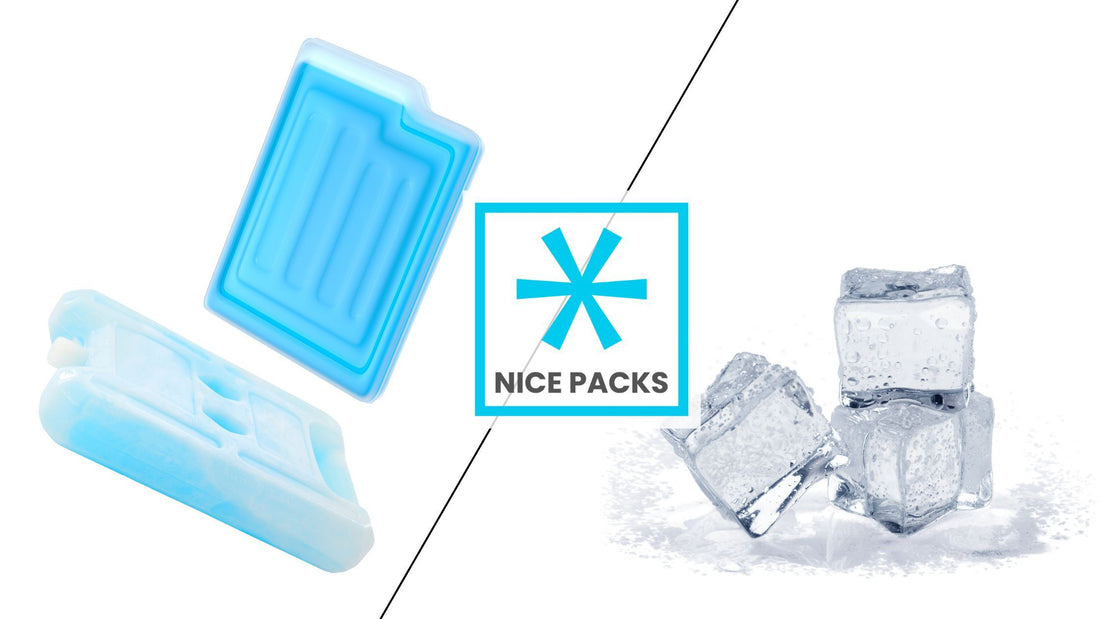When you're injured or need to keep something cool, your go-to options are often ice packs and ice cubes. But which one should you reach for? Is one better than the other? Well, let's dive into this chilly debate and find out which is more effective: ice packs or ice cubes!
What Are Ice Packs?

Credit: Envato Elements/ varyapigu
Ice packs are handy, portable bags designed to keep things cold or provide relief in various situations. They come in different types, such as those filled with dry ice, liquid, or a special gel that stays cold. They serve various purposes, such as maintaining the freshness of food during shipping, keeping your drinks and snacks cool in a cooler, or even helping to soothe injuries by reducing swelling after accidents or falls.
Types of Ice Packs
Ice packs come in various types depending on what they're filled with:
1) Dry Ice Packs
Credit: Nice Packs
Dry ice packs may sound like they're filled with dry ice, but they're not! Their name comes from the fact that they stay dry even when they're cold. These special ice packs are made of a non-toxic material that expands when it gets wet. To use them, you need to first soak them in water and then pop them in the freezer for a couple of hours. Once they're frozen, they can stay cold for a really long time.
The cool thing about dry ice packs, like the ones from Nice Packs, is that they're reusable. Also, they won't make a mess, and you can cut them to the size you want. They are best used in the shipping business for shipping ice cream products, meat products, and more.
2) Gel Packs

Credit: Envato Elements/ Nuala-images
Gel ice packs are like squishy bags filled with a special kind of jelly and a mixture of water. You can put them in the freezer to make them cold, or in the microwave to make them hot. They're great for keeping your lunch cool in a lunchbox or soothing a sore muscle when heated up. These packs are made with a material called polypropylene so they won't leak, even if they face rough weather or get bumped around. You can find them in different sizes and shapes, and the best part is you can reuse them.
3) Instant Ice Packs

Credit: Envato Elements/ varyapigu
Instant ice packs are commonly found in first aid kits and serve a specific purpose. They consist of a pouch containing two chemicals. When you squeeze the ice pack, these chemicals mix and create a cooling effect through an endothermic process. This instantly lowers the temperature of the pack. Typically, an instant ice pack stays cold for about 20 minutes, but this duration may vary depending on the surrounding temperature.
Unlike other ice packs that can be used multiple times, instant ice packs are meant for one-time use only. They don't require a refrigerator to become cold, making them convenient for emergencies.
Are Ice Packs Toxic?
This depends on the ice pack manufacturers and the components used to make the ice pack. Ice packs containing petroleum can be harmful, so it's important to avoid those. Fortunately, nowadays, most ice packs are made from non-toxic materials and are free from BPA, making them safe to use.
What Are Ice Cubes?

Credit: Envato Elements/ Alex9500
Ice cubes are small blocks of frozen water that are used to keep food and drinks chilled. They are also known as ice bricks or loose ice. Like ice packs, ice cubes are also used in the medical field. They help reduce pain and swelling and speed up the healing process.
Which One Is Better?

When comparing cold packs to ice cubes, ice packs definitely win the debate. Here are a few reasons why:
1) Ice Packs Have a Lower Freezing Temperature

Credit: Envato Elements/ vsoldatov7
The freezing temperature of ice cubes is 32°F (0°C) while the freezing temperature of ice packs is -13°F(-25°C) and can even go lower. On top of this, reusable ice packs can also survive longer when exposed to the elements.
2) Ice Packs Don't Make as Much of a Leaky Mess

Credit: Envato Elements/ karandaev
When ice cubes melt, they turn into liquid water and create a messy pool of water. Ice packs, on the other hand, don't leak as much water. In certain cases, some types of ice packs like dry ice packs from Nice Packs do not release any water at all. This means you won't have to deal with a watery mess at the bottom of your cooler. This helps prevent bacteria growth and food spoilage.
3) Ice Packs Are Reusable

Credit: Envato Elements/ varyapigu
Another great thing about ice packs over regular ice is that they are reusable and can be popped back into the freezer after each use. The more you use them, the more you save by not having to constantly buy ice cubes.
Which Ice Packs Last the Longest?
Credit: Nice Packs
Dry ice packs last longer than most ice packs. While instant or gel packs stay cold for a few hours, dry ice packs can stay cold for a whole day when used correctly. Plus, when they melt, they don't make a mess, keeping your food in great condition. Plus, they're 3–4 times colder than regular ice and typical ice packs.
What's even better is that you don't need a bunch of them to keep your cooler cold for a long time. Just one dry ice pack can do the job effectively.
FAQ Section
Q1: Are ice packs and ice cubes interchangeable for all purposes?
While both ice packs and ice cubes serve cooling purposes, they are not always interchangeable. Ice packs, especially dry ice packs, are more effective for long-term cooling and are preferred for medical use and keeping perishables cold during travel.
Ice cubes, on the other hand, tend to melt quickly and are more suitable for short-term cooling in beverages and certain emergency situations.
Q2: Can ice packs be recycled or disposed of responsibly?
Yes, but it's essential to check with your local recycling facilities for specific guidelines. If your ice packs are not recyclable, dispose of them according to your area's waste disposal regulations. Be sure to remove any non-recyclable components and follow any provided disposal instructions.
Q3: Do ice packs have a shelf life or expiration date?
Most ice packs do not have a specific expiration date. However, over time, the effectiveness of the gel or materials inside the pack may diminish.
Q4: How should you clean ice packs?
To clean them, wipe the surface with a damp cloth or mild soapy water, then rinse and dry thoroughly before storing them in the freezer for future use.
Q5: How do I know if I'm using enough ice packs in my cooler?
Use about 1-2 pounds (0.45-0.9 kilograms) of ice packs per quart (liter) of cooler space. If items remain adequately chilled, and the cooler maintains a safe temperature (below 40°F or 4°C for perishables), you're using enough ice packs.
Summary
When comparing ice packs vs ice cubes, ice packs definitely win the debate. Among ice packs, dry ice packs are the best type of ice packs that you can own. If you're searching for the best ice packs, be sure to check out Nice Packs Dry Ice Packs. With Nice Packs, you can trust in top-notch cooling performance and convenience for all your cooling needs. Check out our reusable ice pack today.




